Around the Swimming World: What Anton Chupkov Does Better than Anyone
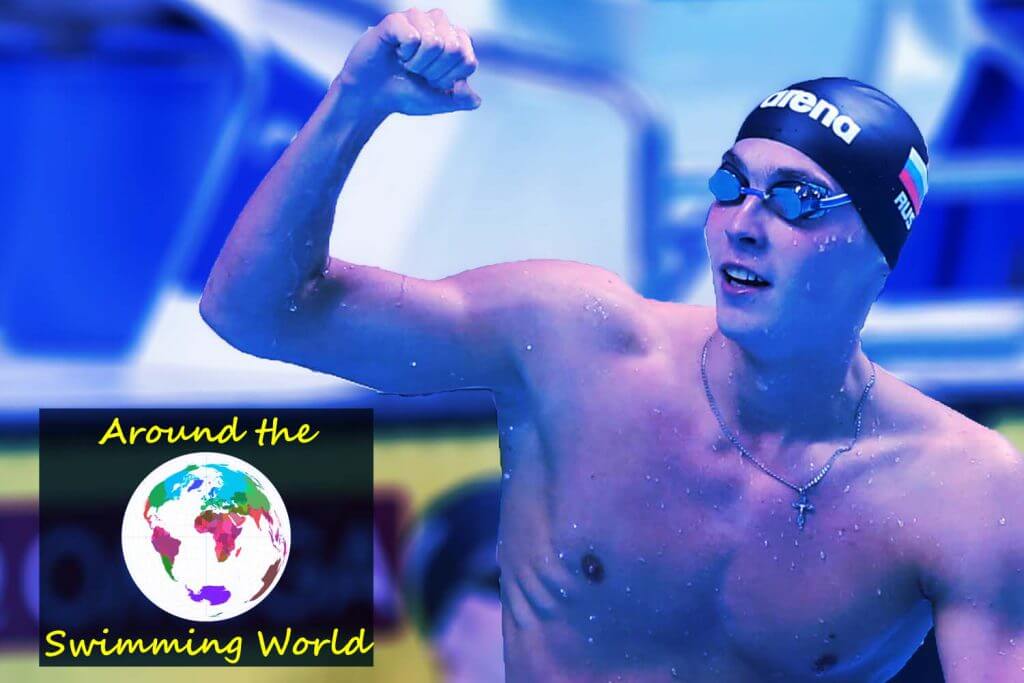
By David Rieder.
When Anton Chupkov swims the first 100 meters of his 200 breaststroke, he’s in no hurry. Check out his swim from the final at the European Championships: On the second length, Chupkov swims with the slowest stroke tempo, taking one stroke approximately every 2.2 seconds or so.
He sat seventh at the 50, but on that second length, he lost virtually no ground on his competition, his 32.62 split tied for second-best in the field and just one-hundredth off the best split.
The third 50 is when Chupkov distinguishes himself, not just in that European final but in virtually every major 200 breast competition. His home-coming splits were 32.53 (six-tenths faster than anyone else) and 31.89 (nine tenths faster). And that finish almost brought him to world-record territory.
Chupkov came up just short, with a 2:06.80. Ippei Watanabe keeps the world record, the 2:06.67 set in January 2017, but Chupkov is the only other man to ever break 2:07 and the only one to do so on two different occasions. He’s also the only man to ever finish a 200 breast in under 32 seconds, and he’s done that twice, too.
Watanabe’s world-record split on the last 50 was 32.65. At the 2017 World Championships, silver medalist Yasuhiro Koseki finished in 32.78—while Chupkov split 31.99 to steal the gold medal. When American Josh Prenot set the American record in the 200 breast at the 2016 Olympic Trials (2:07.17), his split on the last length was a relatively pedestrian 32.98.
Searching through previous results, the only split close to what Chupkov has unleashed at his best was a 32.36 from Daniel Gyurta at the 2013 World Championships. Gyurta’s time from that meet, 2:07.23, ranks him as the sixth-fastest performer in history behind three Japanese swimmers (Watanabe, Koseki and Akihiro Yamaguchi), Chupkov and Prenot.
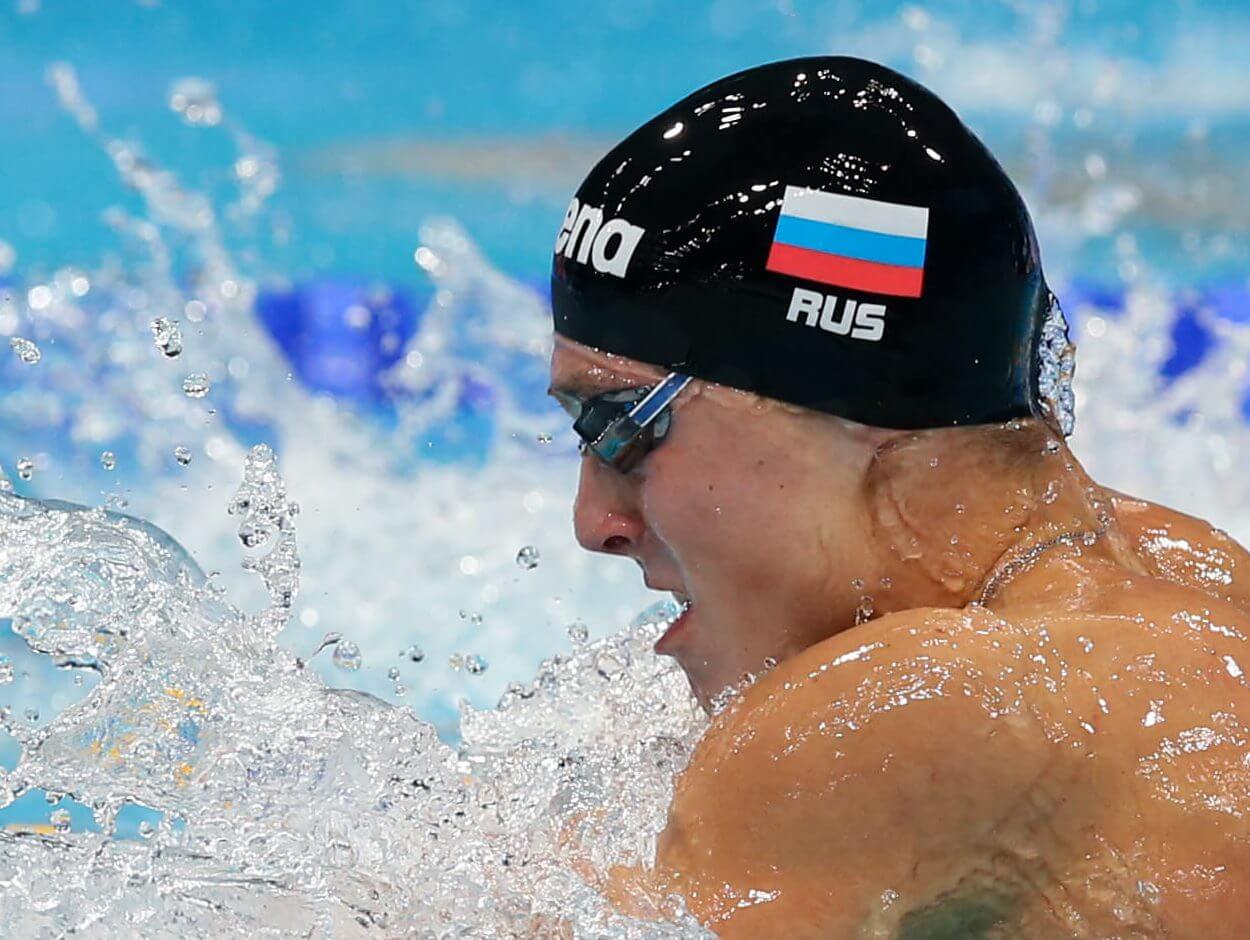
Photo Courtesy: SIPA USA
Meanwhile, it’s not at all unusual to see breaststrokers splitting above 34 seconds on the last length. American Kevin Cordes has fallen victim to the last 50 in so many major races over the last five years. In that European final, Dutch swimmer Arno Kamminga led at the 50, was second at the 100 and second behind Chupkov at the 150. He ended up finishing seventh after a 34.49 final split.
And then there’s Chupkov, who is lightyears ahead of even otherwise-strong finishers on that length. He can keep pace with the field with by basically doing a long-glide drill through the first 100. And then he unleashes his weapon—and twice now, on the biggest occasions, it has worked beautifully.
On the other hand, Watanabe still has the world record in the event, but he has never put his best effort together in a major final. Six months after his world-record swim, he faded to third at last year’s World Championships. In 2016, Watanabe set an Olympic record in the Rio semi-finals (2:07.22) but ended up sixth in a final where his Olympic record was not touched.
Watanabe will have his chance to respond on Sunday at the Pan Pacific Championships, and so will Koseki and Prenot. Until any of that trio manage a 2:06 in a significant final, Chupkov will be the man to beat—or at least try to hold off—in the 200 breast.
Wet Take
Saturday’s timing system screw-up that slowed down times in nine races by one-tenth? It could have been much worse.
Adam Peaty didn’t lose his world record. He didn’t lose a 56-second 100 breast, either. The error had been corrected by the men’s 50 back final, when Kliment Kolesnikov swam a time of 24.00 for a new world record.
Simona Quadarella adds a tenth to her 800 free time, meaning that instead of being ranked seventh all-time in the event, she’s now eighth. James Wilby is now tied for fourth all-time in the 100 breast, instead of being ranked third. Still, those times (8:16.45 and 58.64, respectively) are incredible breakout efforts.
No, the situation is not a great look for LEN. This kind of situation is the last thing you want at any swim meet on any level, let alone at a European Championships. Announced right before Sunday’s finals session, the mistake almost overshadowed the racing that night.
But at least the error in each lane and each race was identical, at least the pool wasn’t measured incorrectly, and at least there’s no current. Long-term, this mistake will be forgotten.
Useless Stat of the Day
Peaty raced Yulia Efimova and won by almost eight seconds.
In almost any mixed freestyle relay, two men swim first, followed by two women. Mixed medley relays, on the other hand, are all about putting the fastest combination of four swimmers together, meaning women and men race against each other, often heavily mismatched.
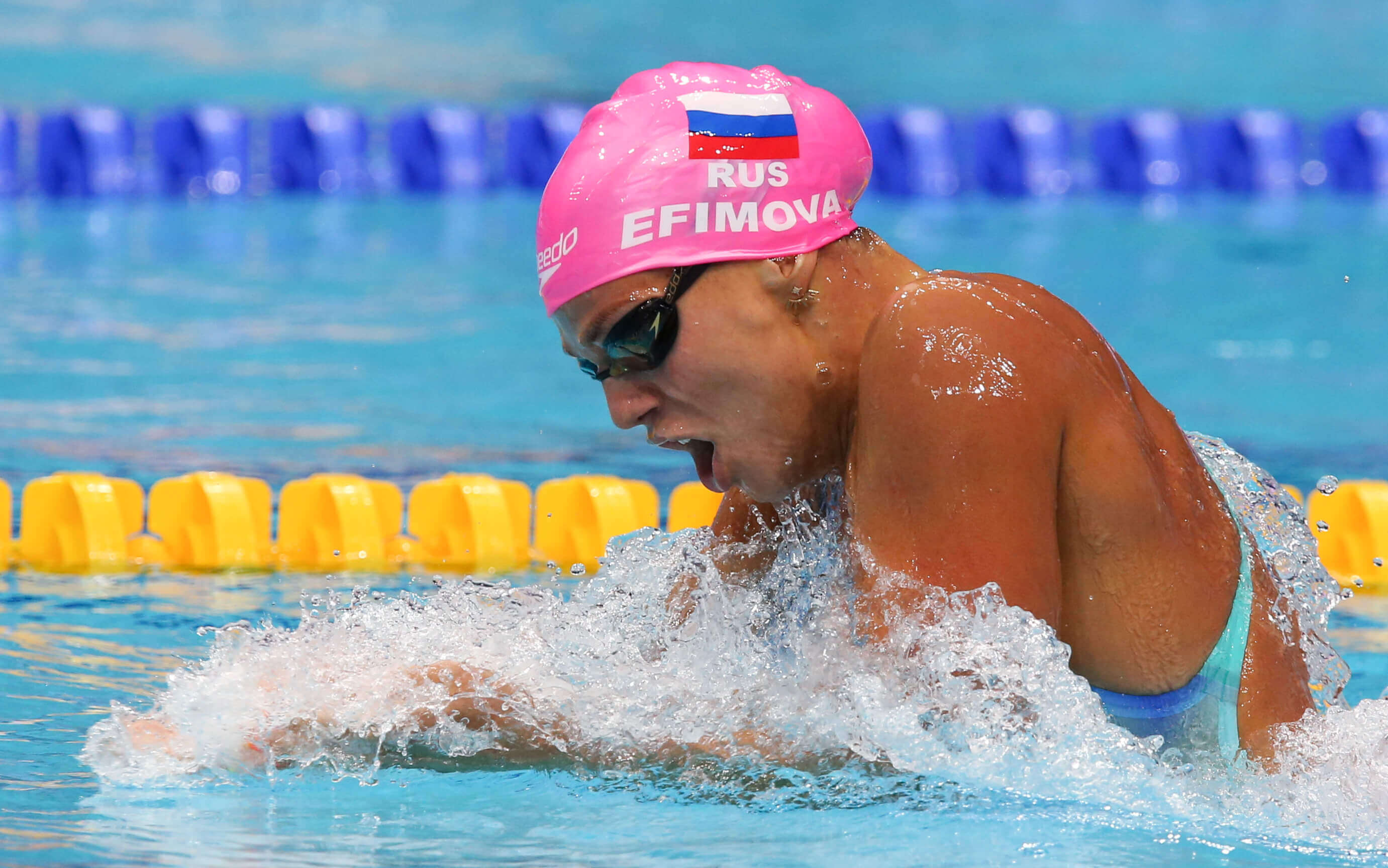
Yulia Efimova — Photo Courtesy: SIPA USA
Take the mixed 4×100 medley relay final at the European Championships, when first-place Great Britain laid out their relay as woman-man-man-woman, and runner-up Russia went man-woman-woman-man. Naturally, both teams wanted to maximize their strengths and minimize their weaknesses.
What resulted was an entertaining, back-and-forth relay where no female swimmer on either team stayed within five seconds of their male counterpart. British anchor Freya Anderson came the closest, swimming exactly five seconds slower than Vladimir Morozov while holding on for gold.
And yes, Efimova, one of the world’s best breaststrokers, split a very fine 1:05.07. There’s absolutely nothing wrong with that—even as Peaty flew by her with a 57.27 split. Not much, even a 6.61-second advantage after backstroke, can get in the way of Peaty’s historic breaststroke capabilities.
Aquatic Stock Watch
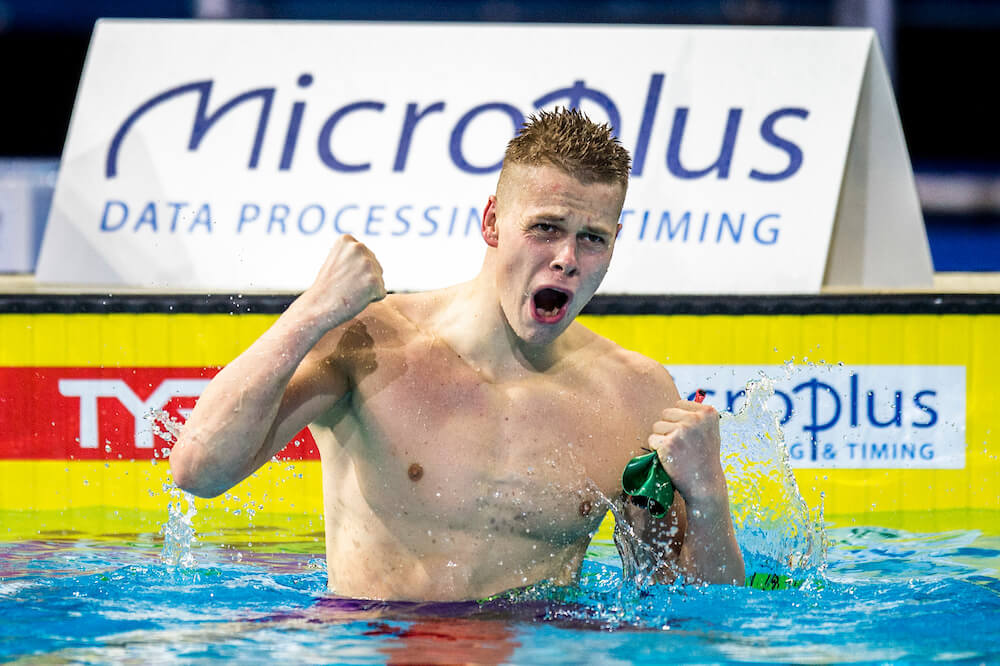
Danas Rapsys — Photo Courtesy: Foto Giorgio Scala / Deepbluemedia /Insidefoto
UP – Danas Rapsys
Rapsys won a 200-meter bronze medal at the last European Championships in 2016—in backstroke. He made the semi-finals of the 200 free at the 2018 World Championships, only to finish 10th. After a 1:46.56 at Worlds, he improved to 1:45.75 a month later at the World University Games.
Over the winter, he swam a 1:40.85 in the short course meters version of the 200 free, making him the sixth-fastest swimmer ever in that event. Now, Rapsys is the top long course swimmer in the world (1:45.12), and he was just off that in winning the European title Monday in 1:45.33.
DOWN – British Men’s 4×200 Free Relay
The Duncan Scott and James Guy-led British men put up a time of 7:05.32 on Sunday, nowhere close to their winning time from last year’s World Championships (7:01.70). Not that they needed to be faster to win their continental championship, but that’s a massive drop-off. Is that a one-year blip or a sign of trouble to come long-term?
Just one year ago, the American men left Budapest with serious concerns about their long-term potential against Great Britain in this relay. Now, it would be a surprise if the Americans, now led improbably by Andrew Seliskar, don’t end up with the world’s fastest time in the event this year after the Pan Pacific Championships.
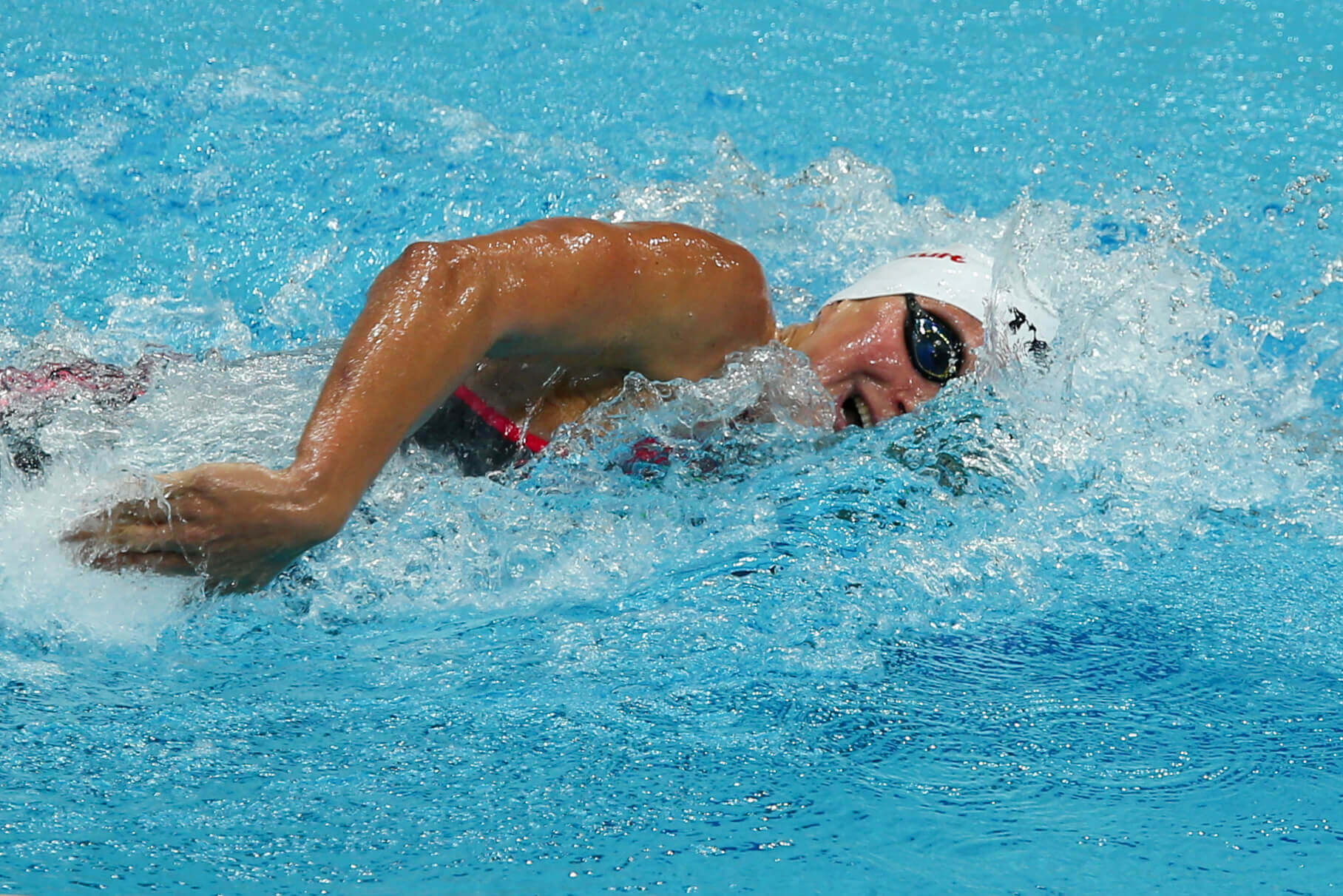
Charlotte Bonnet — Photo Courtesy: SIPA USA
UP – Charlotte Bonnet
Bonnet became just the 12th woman in history to crack 1:55 for a 200 free with her European title in the event Monday. The 23-year-old has been on the verge of a breakthrough for several seasons—she was ninth in the 200 free at the 2015 World Championships, then eighth at both the 2016 Olympics and 2017 Worlds—but before this year, Bonnet had never even cracked 1:56.
Now, she ranks fourth in the world behind Katie Ledecky, Taylor Ruck and Ariarne Titmus. It will be interesting to compare that 1:54.95 to this week’s Pan Pacs results, where the top three women plus fifth-ranked Rikako Ikee and sixth-ranked Allison Schmitt will be in action.
Impact Race of Tomorrow: Women’s 100 Free at European Championships
The 100 free prelims and semi-finals will take place Tuesday, with the final coming Wednesday. The race will include world record-holder Sarah Sjostrom, as well as 2012 Olympic gold medalist Ranomi Kromowidjojo, 2016 50 free gold medalist Pernille Blume and the 1-2 finishers from Monday’s 200 free, Bonnet and Femke Heemskerk.
Could this be a world record attempt for Sjostrom? Probably not. Will she be beaten here? Even less likely. But it’s her best chance this year to put up a time competitive with her main rivals, who happen to rank 1-2-3 in the world right now: Bronte Campbell (52.27), Cate Campbell (52.37) and Simone Manuel (52.54). Cate Campbell and Manuel will both swim the 100 free again this weekend at Pan Pacs.





Too bad Adam Peaty does not do the 200 breast.
He has trief but failed